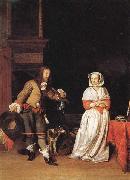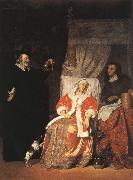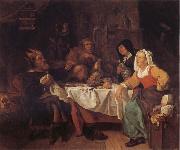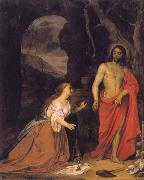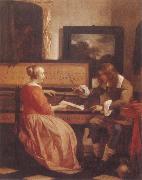Gabriel Metsu Oil Painting ReproductionAll Gabriel Metsu Oil PaintingsGabriël Metsu Gabriël Metsu (January 1629 - buried 24 October 1667) was a Dutch painter of history paintings, genre works and portraits. Metsu was the son of the Flemish painter Jacques Metsu (c.1588-1629), who lived most of his days at Leiden, and Jacomijntje Garniers, his third wife, whom he married in 1625. Jacomijntje was the widow of a painter with three children of her own. Two months after Gabriël's birth, his father died. According to Jacobus Houbraken, Metsu was taught by Gerard Dou, though his early works do not lend colour to this assertion. He was influenced by painters of Leiden such as Jan Steen, and later by Frans van Mieris the Elder. Metsu was registered among the first members of the painters' corporation at Leiden; and the books of the guild also tell us that he remained a member in 1649. In Leiden, it was alleged that Metsu left a brothel at six in the morning and took a prostitute to the Academy. In 1650 he ceased to subscribe, and works bearing his name and the date of 1653 support the belief that he had moved. Metsu was trained in Utrecht by Jan Baptist Weenix and Nicolaus Knepfer. In Amsterdam Metsu lived in an alley on Prinsengracht, where he kept chickens. He got into an argument with a neighbor and moved to a house on the canal side, where a daily vegetable market was held. In 1658 he married Isabella de Wolff, whose father was a potter and mother a painter. The Speed Art Museum has a portrait of the couple. Pieter de Grebber, a religious painter from Haarlem, was her uncle. At the onset of the 1660s Metsu turned for inspiration to the art of the "fijnschilders" from his native Leiden. Metsu was responding to the market of Dou's paintings, who sold his paintings all over for exorbitant prices. Metsu may have also influenced Pieter de Hoogh. Around the year 1661, Metsu won the patronage of the Amsterdam cloth merchant Jan J. Hinlopen and painted his family more than once in a fashionable surrounding. The Poultry-Seller, 1662 At least thirteen of paintings show carpets and he probably used the same model. He included several fine examples of minutely depicted floral and cloudband carpets in his works and even a silk Oriental rug, as well as so-called "Lotto" rugs which he for some reason, in contrast to his meticulous rendering of the floral carpets, depicted only in a very sketchy fashion. After Metsu died, his widow left for Enkhuizen, to live with her mother. |
|||

|
|||
|
|
|||
|
||||||||
| Gabriel Metsu Gabriël Metsu Gabriël Metsu (January 1629 - buried 24 October 1667) was a Dutch painter of history paintings, genre works and portraits. Metsu was the son of the Flemish painter Jacques Metsu (c.1588-1629), who lived most of his days at Leiden, and Jacomijntje Garniers, his third wife, whom he married in 1625. Jacomijntje was the widow of a painter with three children of her own. Two months after Gabriël's birth, his father died. According to Jacobus Houbraken, Metsu was taught by Gerard Dou, though his early works do not lend colour to this assertion. He was influenced by painters of Leiden such as Jan Steen, and later by Frans van Mieris the Elder. Metsu was registered among the first members of the painters' corporation at Leiden; and the books of the guild also tell us that he remained a member in 1649. In Leiden, it was alleged that Metsu left a brothel at six in the morning and took a prostitute to the Academy. In 1650 he ceased to subscribe, and works bearing his name and the date of 1653 support the belief that he had moved. Metsu was trained in Utrecht by Jan Baptist Weenix and Nicolaus Knepfer. In Amsterdam Metsu lived in an alley on Prinsengracht, where he kept chickens. He got into an argument with a neighbor and moved to a house on the canal side, where a daily vegetable market was held. In 1658 he married Isabella de Wolff, whose father was a potter and mother a painter. The Speed Art Museum has a portrait of the couple. Pieter de Grebber, a religious painter from Haarlem, was her uncle. At the onset of the 1660s Metsu turned for inspiration to the art of the "fijnschilders" from his native Leiden. Metsu was responding to the market of Dou's paintings, who sold his paintings all over for exorbitant prices. Metsu may have also influenced Pieter de Hoogh. Around the year 1661, Metsu won the patronage of the Amsterdam cloth merchant Jan J. Hinlopen and painted his family more than once in a fashionable surrounding. The Poultry-Seller, 1662 At least thirteen of paintings show carpets and he probably used the same model. He included several fine examples of minutely depicted floral and cloudband carpets in his works and even a silk Oriental rug, as well as so-called "Lotto" rugs which he for some reason, in contrast to his meticulous rendering of the floral carpets, depicted only in a very sketchy fashion. After Metsu died, his widow left for Enkhuizen, to live with her mother. |
||||||||
|
|
||||||||
| Gemälde IDENTIFIZIERUNG:: 28962 eine Dame und einKavalier A Lady and a Cavalier mk65 Öl auf Unterausschuss 22 13/16x16 11/16in Uffizi mk65 Oil on panel 22 13/16x16 11/16in Uffizi |
||||||||
|
|
||||||||
| Gemälde IDENTIFIZIERUNG:: 31357 Besuch vom Arzt Visit of the Physician nn07 1660-67 Öle auf Leinwand 61 X 48 cm Der Einsiedlei Str. Petersburg nn07 1660-67 Oil on canvas, 61 x 48 cm The Hermitage, St. Petersburg |
||||||||
|
|
||||||||
| Gemälde IDENTIFIZIERUNG:: 33736 Der König Trinkt The King Drinks mk86 c.1650- 1655 ÖL auf canva 80.9x98.9cm München, Bayerische Staatsgemaldesammlungen, Alte Pinakothek mk86 c.1650-1655 OIl on canva 80.9x98.9cm Munich,Bayerische Staatsgemaldesammlungen,Alte Pinakothek |
||||||||
|
|
||||||||
| Gemälde IDENTIFIZIERUNG:: 39685 Noli mich tangere Noli me tangere der 63.7x51cm von mk150 1667 mk150 1667 63.7x51cm |
||||||||
|
|
||||||||
| Gemälde IDENTIFIZIERUNG:: 40496 ein Mann und eine Frau Wird von einem Jungfräulichen Gesetzt A Man and a Woman Seated by a Virginal das Öl von mk156 C.1665 auf Leinwand 76x68cm mk156 c.1665 Oil on canvas 76x68cm |
||||||||
|
|
||||||||
| VORHERIGER KÜNSTLER NÄCHSTER KÜNSTLER | ||||||||
|
|
||||||||
|
Gabriel Metsu Gabriël Metsu Gabriël Metsu (January 1629 - buried 24 October 1667) was a Dutch painter of history paintings, genre works and portraits. Metsu was the son of the Flemish painter Jacques Metsu (c.1588-1629), who lived most of his days at Leiden, and Jacomijntje Garniers, his third wife, whom he married in 1625. Jacomijntje was the widow of a painter with three children of her own. Two months after Gabriël's birth, his father died. According to Jacobus Houbraken, Metsu was taught by Gerard Dou, though his early works do not lend colour to this assertion. He was influenced by painters of Leiden such as Jan Steen, and later by Frans van Mieris the Elder. Metsu was registered among the first members of the painters' corporation at Leiden; and the books of the guild also tell us that he remained a member in 1649. In Leiden, it was alleged that Metsu left a brothel at six in the morning and took a prostitute to the Academy. In 1650 he ceased to subscribe, and works bearing his name and the date of 1653 support the belief that he had moved. Metsu was trained in Utrecht by Jan Baptist Weenix and Nicolaus Knepfer. In Amsterdam Metsu lived in an alley on Prinsengracht, where he kept chickens. He got into an argument with a neighbor and moved to a house on the canal side, where a daily vegetable market was held. In 1658 he married Isabella de Wolff, whose father was a potter and mother a painter. The Speed Art Museum has a portrait of the couple. Pieter de Grebber, a religious painter from Haarlem, was her uncle. At the onset of the 1660s Metsu turned for inspiration to the art of the "fijnschilders" from his native Leiden. Metsu was responding to the market of Dou's paintings, who sold his paintings all over for exorbitant prices. Metsu may have also influenced Pieter de Hoogh. Around the year 1661, Metsu won the patronage of the Amsterdam cloth merchant Jan J. Hinlopen and painted his family more than once in a fashionable surrounding. The Poultry-Seller, 1662 At least thirteen of paintings show carpets and he probably used the same model. He included several fine examples of minutely depicted floral and cloudband carpets in his works and even a silk Oriental rug, as well as so-called "Lotto" rugs which he for some reason, in contrast to his meticulous rendering of the floral carpets, depicted only in a very sketchy fashion. After Metsu died, his widow left for Enkhuizen, to live with her mother. |
||||||||
|
|
||||||||
|
KONTAKTIEREN Sie UNS |





